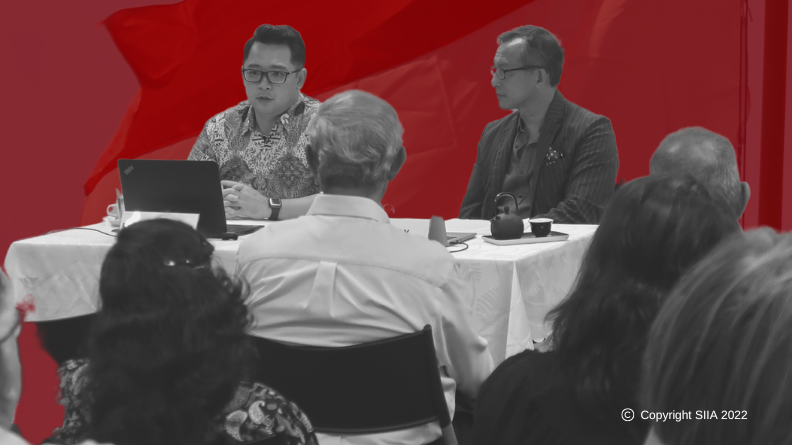As Indonesia continues to expand its role in international and regional affairs ahead of its 2024 Presidential election, many view its incoming ASEAN chairmanship with great importance for Indonesia and ASEAN’s future. This was the focus of a morning talk on Indonesia organised by the Singapore Institute of International Affairs (SIIA) on 18th November 2022.
Entitled “Indonesia’s Road Ahead: Regional Leadership and Political Succession”, the talk explored key issues that Indonesia will have to contend with during ASEAN chairmanship.
The speaker for the session was Dr Evan A. Laksmana, Senior Research Fellow with the Centre on Asia and Globalisation at the Lee Kuan Yew School of Public Policy, National University of Singapore. Professor Simon Tay, Chairman of SIIA, served as the moderator.
Professor Simon Tay opened the talk by setting the context of Indonesia’s position within the region – Indonesia has outsized influence compared to its ASEAN neighbours, due to the size of its population and economy. Therefore, there are also outsized expectations of Indonesia’s ASEAN chairmanship.
Understanding Indonesia’s Foreign Policy
Dr Evan began by distilling the basic features of Indonesia’s foreign policy. While President Jokowi is the ultimate decision maker, there is no strategic hub that maintains coordination among government bodies. The various ministries and agencies operate separately with their own foreign policy positions. Therefore, it is difficult to accurately ascertain Indonesia’s foreign policy on issues, as there is no coherent government position.
In general, Dr Evan pinpointed that President Jokowi’s focus was on economic issues rather than geopolitics, with more attention on topics such as investment and trade. There are also powerful domestic players outside of the government that have strong influence on policy, including business groups that have veto power over major business and infrastructure decisions.
Indonesia’s G20 Presidency
While many were quick to proclaim the G20 Summit a success, it is important to assess Indonesia’s G20 performance based on both process and outcome. The summit’s process was a success, as there was no major boycott, and the group was able to pass a joint communique. Regarding the outcome, Indonesia gained benefits, as evident from the 20 billion Just Energy Transition Partnership (JETP) deal with the G7 countries. However, beyond Indonesia’s own interests, the success of the summit’s outcome remains difficult to determine. While Indonesia was successful in launching The Pandemic Fund, larger geopolitical issues such as the Russian invasion of Ukraine remain beyond the summit’s influence. Overall, the G20 Summit worked due to the alignment of interests and opportunities, especially for the business community in Indonesia.
Expectations for ASEAN Chairmanship
For the upcoming ASEAN Chairmanship in 2023, Indonesia will try to replicate the economic success of its G20 Presidency. This is emphasised in the theme of its ASEAN Chairmanship, “ASEAN Affairs: Epicentre of Growth.” But unlike the G20, ASEAN is concerned not only with economic issues, but also political-security and socio-cultural issues. Indonesia will have to tackle the complex challenge of the Myanmar crisis and there are expectations that Indonesia will expanding the exclusion of Myanmar from ASEAN functions.
To alleviate pressure off itself, Indonesia might look at less complicated issues such as the ASEAN Food Safety Network. This could entail strengthening food security for riparian communities instead of addressing territorial disputes surrounding the Mekong River directly. Another achievable task, that might cement Indonesia’s legacy as ASEAN Chair, is the admission of Timor-Leste into ASEAN.
Domestically, the upcoming 2024 presidential and general elections will reduce Indonesia’s bandwidth to deal with foreign policy matters. Political jockeying will soon begin and obfuscate the foreign policy landscape.
Ultimately, the challenge for Indonesia is how it could align the massive expectations of its ASEAN Chairmanship with its core interests, to replicate the economic success of its G20 Presidency.
Indonesia’s Economic Partnerships
Questions from the audience focused on Indonesia’s economic partnerships. In his response, Dr Evan highlighted that the Indonesia economy is still undergoing a post-Suharto transition. Economic decentralisation has made it difficult for external parties to have clarity on how they can cooperate with Indonesia. The challenge is how different stakeholders can find new growth areas that can benefit everyone.
On economic partnerships, Dr Evan pointed to Indonesia’s 2019 agreement with Australia, the Indonesia–Australia Comprehensive Economic Partnership Agreement (IA-CEPA). The IA-CEPA opens up many new areas of collaboration, including Indonesia’s moves towards fintech. As fintech grows within Indonesia, so will the impulse for localisation and nationalism. However, Dr Evan explained that while such public framings might be popular, Indonesian stakeholders are practical in continuing cooperation with external partners for positive economic outcomes.
Indonesia will have to contend with two contradictory trends i.e., growing calls for localisation and growing demand for international companies and foreign capital to enter the domestic market.




